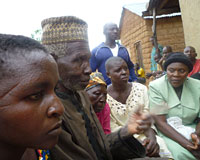At the mass grave of Dogo Na Hauwa
by - 10th June 2010
 As England reels from the horror of the Cumbrian slaughter, one small village in a similarly lush and hilly corner of Nigeria is coping with grief of an altogether different magnitude. I try to imagine the 371 mutilated bodies lying beneath the sweet red soil of Dogo Na Hauwa (the name has since been changed to Gyang-buruk) half an hour out of Jos - and fail utterly. The sun is shining, the beauty of the tousled children is beguiling.
As England reels from the horror of the Cumbrian slaughter, one small village in a similarly lush and hilly corner of Nigeria is coping with grief of an altogether different magnitude. I try to imagine the 371 mutilated bodies lying beneath the sweet red soil of Dogo Na Hauwa (the name has since been changed to Gyang-buruk) half an hour out of Jos - and fail utterly. The sun is shining, the beauty of the tousled children is beguiling.
Then I notice that one little girl with her tummy sticking out, and her hair in bunches, has something missing.
It’s an arm.
The village I’ve just walked through, waving and smiling, was attacked on 7 March by the same Hausa men who had lived here with their Christian neighbours for 50 years. Wearing soldiers’ uniforms, and firing guns that only the military are allowed, they came at 3am and as the terrified villagers scattered into the surrounding fields, they were hacked to pieces by youths waiting to ambush them.
Newborn babies were thrown into fires. Pretty infants bear hideous weals from machete slices. There are mothers who can no longer cook for their families – they do not have enough fingers left.
All this was perpetrated in one two-hour orgy of madness for reasons no one can fathom. The forgiveness of the sad old head man Daniel Jik who lost two sons and eight grandchildren is beyond comprehension.
‘I have forgiven them because that is the law of God.’
He it was who had personally escorted the Hausa who wished to move out in January, after the internecine ‘crisis’ that re-erupted in this volatile highland state just after Christmas.
They were afraid there might be reprisals – and they left suddenly, but in peace.
Yet it was these same Hausa who returned two months later to kill and maim the chief’s entire family, and hundreds more.
Suddenly, as we talk, into the village clearing walks a very old man whom everyone greets and beckons to come over.
Wrinkled and thin, he sits down on the bench between a young mother with a gash on her head and an old lady whose right arm is now just a stump. To her left sit women whose hands are no longer hands, but useless bits of bone and unhealed flesh.
This is the last Hausa man in the village – Malam Idi Inusa, 80-something, and originally from Sokoto, the Hausa heartland. Someone translates for him: that he decided to stay ‘because he has had a very good relationship with the people here. He had never been in a fracas or any problem between him and them.’
Even his mother was among those who decided to leave. ‘Before and after this incident no one has ever asked him not to practise his religion – so he still does.’
This is a village of extraordinary, common decency. Inusa – and the Muslim laundry man who still comes with the washing – are surely testimony to the lie the Western media bought that Christians were to blame for what happened.
Here they even feed the soldiers now guarding them – the same soldiers who failed them. Despite a state curfew, roadblocks at every exit point to the town, and the proximity of the Jos barracks - it took us just half an hour to get to the village, despite an unmade road more like a mining disaster than a road - soldiers arrived two and a half hours after the killing began. Everyone in Nigeria owns a mobile phone today. In a state of emergency, two and a half hours is complicity to the crime.
There was a strategy to this horror; it was being planned for months, and executed in secret with devastating effect.
The man who acts as our guide, Gabriel Gyang, is a civil servant who works for Nigeria’s Sport’s Council. He’s leading the fight for justice. The case was lodged last Friday (4 June) and it’s coming up for a hearing on 22 June. They’re suing the whole of the Joint Task Force for compensation for the destruction of their economy and negligence.
‘The security leaders have to be removed. They have to be changed. We don’t want to see them in Plateau again.’
Apart from the cold-blooded murders, 60 irrigation machines and 100 motor cycles were destroyed. Medical bills for the injured are colossal – there is no NHS. Just one unhealed hand will cost N20,000 – about £100 – to fix; a mountainous sum for a subsistence farmer.
An African now rules the world’s most effective democracy. There is no excuse for failure on this scale on the continent that spawned him.
And there’s no excuse if the rest of the world turns a blind eye to a crime against humanity that has more than a hint of state collusion.
- Log in to post comments
